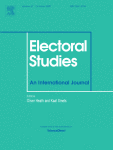From Electoral Studies
We study the political consequences of lifting restrictions on the funding of groups engaging in outside spending (e.g., independent political advertising) in elections. Theoretically, we assume that outside spending changes the salience of candidate-specific attributes relative to their party labels. Empirically, we employ a difference-in-differences design that exploits the removal of state-level restrictions on the funding of outside spending mandated by the federal-level rulings in both Citizens United and SpeechNow.org v. FEC. We find strong evidence that these regulatory changes increase the electoral success of Republican candidates, thereby leading to more ideologically conservative legislatures. We find no effect on polarization. Consistent with our theory, the size of our estimated effects depends on the power of labor unions and the alignment of business interests with the Republican party.

